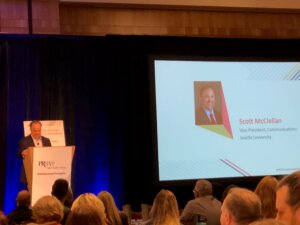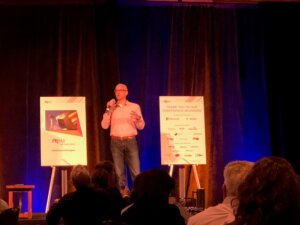Public relations is a constantly changing field. I had the privilege of attending the inaugural PRSA North District #PRSAGameChangers conference in late April. This was my first Public Relations Society of America conference, and it had an all-star lineup of communications professionals who are leaders in their field, from the former White House press secretary during 9/11 to the Editor-in-Chief of WIRED, as well as many other great professionals eager to share some tips to mastering the art of public relations.
A lot of amazing information was absorbed, and I’m excited to share my top five takeaways:
Manage Your Personal Brand as Diligently as You Manage Your Clients’ Brands
Nicole Leverich, senior director of corporate communications at LinkedIn, discussed how to “know your brand” as well as some helpful tools to position yourself and your brand in the best light. One of the key takeaways from her presentation was that you should be able to share your personal brand in five words or less. Keep it short, and practice it, so it flows smoothly. Another great tip for businesses was to always be posting on LinkedIn (and no, this was not a shameless plug); it truly connects you to opportunity! In fact, it’s something we recommend for all of our clients here at Kiterocket. Be sure to download our how-to for social selling for more information.
Build Relationships & Maintain Trust
 Scott McClellan, vice president of communications at Seattle University and former White House press secretary during the September 11 terrorist attacks, discussed his time in the White House, as well as how “your most important aspect is your creditability.” Your credibility is derived from your values and ideas. By upholding strong values and ideas, you help establish—and maintain—your creditability. This really resonated with me, because I strive to be a reliable, creditable resource—both for clients and for media.
Scott McClellan, vice president of communications at Seattle University and former White House press secretary during the September 11 terrorist attacks, discussed his time in the White House, as well as how “your most important aspect is your creditability.” Your credibility is derived from your values and ideas. By upholding strong values and ideas, you help establish—and maintain—your creditability. This really resonated with me, because I strive to be a reliable, creditable resource—both for clients and for media.
Convergence of Technology & Society
Nick Thompson, Editor-in-Chief of WIRED magazine, walked us through the convergence of technology and society. Right now, there are a lot of mixed feelings about AI and advanced technology having the capability of performing jobs and tasks that, historically, humans have been accustomed to doing. Nick, however, made a strong case for advancing technology. He pointed out that technology advances with information, and the more information you’re willing to give, the more advanced that technology will become. So, while people tend to focus on concern about robots taking their jobs, Nick says the focus really should be on the convergence of technology and society, and how to align the two to achieve business goals. He shared a great hypothetical example of this about self-driving semi-trucks and truckers fearing that technology will eliminate their occupation. Nick explained that while technology may eliminate the job of driving long distances, there will still be a need for precise maneuvering when the trucks enter major cities. This precise maneuvering would be best conducted by human drivers familiar with city roads and truck regulations, thus illustrating an example of the convergence between new technology and society.
There Is No Place for Spin in a Crisis
Matt McKenna, co-founder of Greenbrier, a crisis management agency, discussed the art of communicating during a crisis. Crisis PR is an area that has always fascinated me. High pressure. High stakes. Zero prep time. There were a few simple, yet powerful, takeaways for me from this session. First, facts never need “spin.” Trying to justify or position facts will open you up to trouble. Secondly, if you don’t have an answer to a question, don’t speculate; it’s best to be honest, say you will get back with an answer, and get back with the correct answer. He concluded with a few pointers on the art of the apology. While this may seem straightforward, apologies are where many companies (and executives) tend to get themselves into trouble—either by not being sincere and doing so too quickly, or by dragging on the apology. Matt’s advice was to apologize once, effectively, and move on.
Find Work That Satisfies Your Soul
Oliver Roll, chief communications officer for CISCO, provided an inspirational session that touched on his key learnings throughout his career. He focused on finding your “soul work”—something you enjoy doing, so it doesn’t feel like “work” even when you’re working. Oliver left us with a great quote that really stuck with me: “positivity is infectious.” He talked about how you can bring this into both your professional and personal life, and that by being positive, you “infect” others and continue the positivity circle. This really resonated with me because I’ve found my soul work in public relations. It is truly something I enjoy doing daily—and I hope everyone can find a “job” they are as passionate about and rewarded by as I am in PR.


